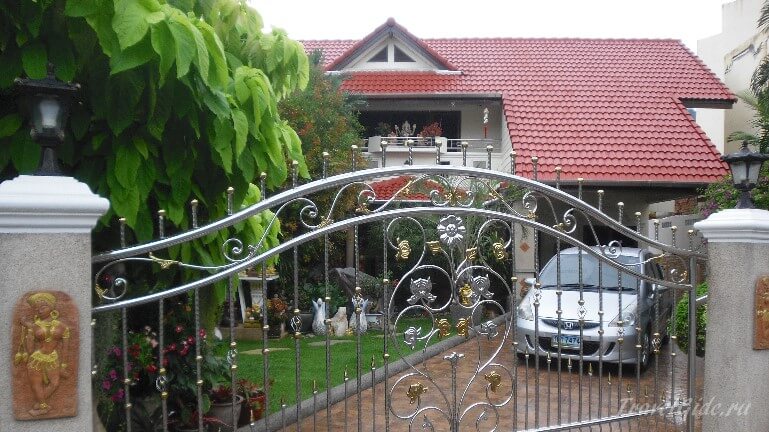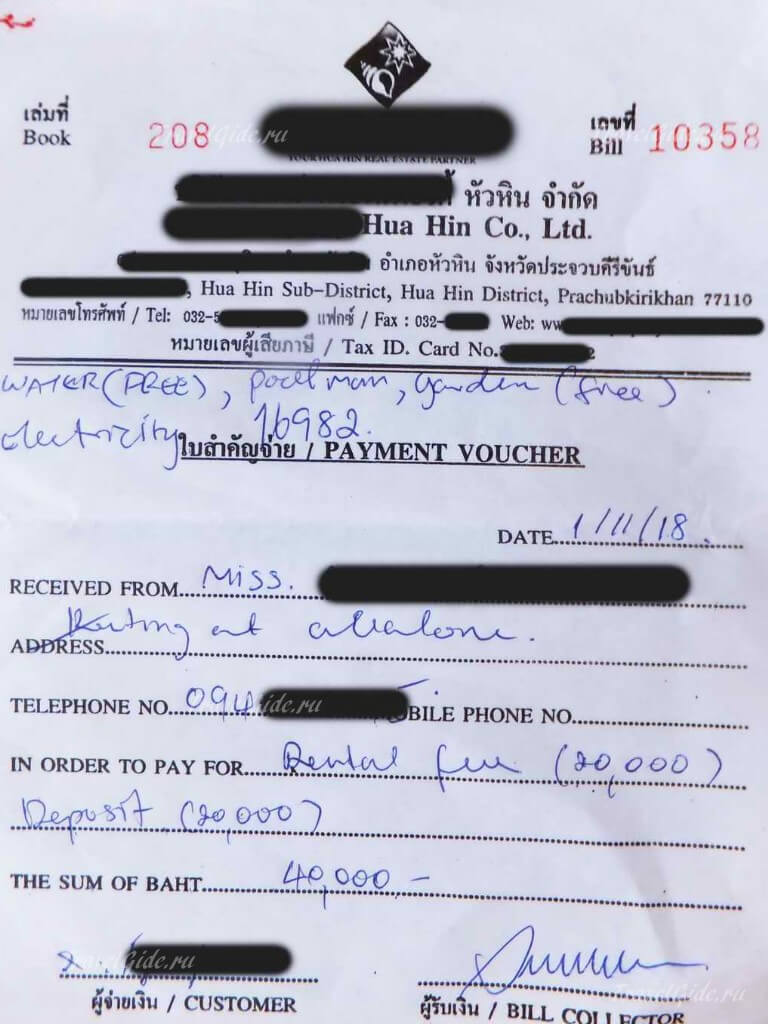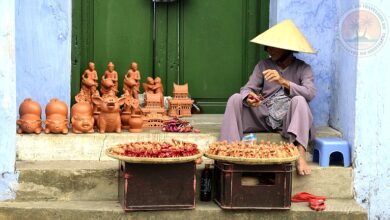
How to rent a house in Thailand: from inspection to rental agreement
FROMtatya will be of interest to those who plan rent a house in thailand. At first glance, renting a house in Thailand is not at all a difficult task. However, there are nuances, both when renting independently and when renting with the help of a real estate agency. The article is not at all entertaining, but it will help many to remember about elementary security measures, as well as highlight important details of the issue.
Inspection and inspection of the house for rent
And so you are in Thailand and for some reason do not want to live in a guesthouse or a luxury hotel like Rawi Warin Resort & SPA on Koh Lanta. The right decision to rent a separate house. There are definite advantages to this. At least you can cook Thai food at home and save a lot at the same time. I will not tell you where to look for housing for rent: there is nothing new here - ads, agencies, information from social networks, from friends, acquaintances and just fellow travelers. The most interesting next...
You looked at several options for houses and finally made your choice. At the appointed time, you arrive with the money to sign the contract. Needless to say, the signing should take place in your future rented house.
This is logical, because, firstly, you need to look and check everything again, and secondly, after paying and signing the contract, you should solemnly hand over the keys.
What should be checked during the inspection?
I recommend that you once again calmly inspect the house inside and out and make sure that everything works, the roof is intact, and the floors do not fail. At the expense of the roof and floor, too much, but it will not be superfluous to inspect the ceiling.
It is necessary to check how the water flows in the shower and in the taps, what color it is, whether the gas stove works, whether there are broken handles, cabinet doors and other things.
All fix breakage immediately with the landlord. Trust me, he'll be fine with it. Other people lived in the house before you, and he himself may not know about some malfunctions!
Better To take pictures the general condition of the house and faults, if any. At the end of the lease period, they may no longer remember that, for example, this top shelf of the refrigerator was already broken before you.
Fixing meter readings
Be sure to ask where the meters are and record their readings at the time of entry. The easiest way, again, is to take a picture. From these readings you will start when the first bill for electricity and water comes. Thus, you will not overpay extra and you will know exactly how much you spend per month.
The financial side of renting a residential building
The financial side of the issue when renting a house in Thailand, or rather its final result, largely depends on how carefully you approach its solution and find out all the nuances of payment. It directly depends on the amount of rent, security deposit and additional payments.
Security deposit for accommodation
Negotiate the amount of the deposit and the terms of the return before signing the lease. When you read the contract, check that the words do not differ from what is written on paper.
As a standard, a security deposit is taken in the amount of one month's rent and returned at the end of the lease period, if the condition of the house and property is preserved in the same form in which it was transferred to you.
The deposit can be either more or less than the amount of the monthly payment. It depends on the condition of the house and the value of the property in it. If you found a house through an agency, be prepared for the fact that there will be a deposit.
If you found a house on your own, then there may be options, as agreed. You can bargain and double the deposit amount, it all depends on the specific situation. The deposit in the contract is called the holding deposit, which literally translates as "prepayment". I will elaborate on the clauses of the agreement below.
Additional payments for stay
In addition to the basic monthly payment for renting a house, you may be charged additional fees. Usually, These types of payments include:
- Mandatory payment electricity by counters, water (may be included in the monthly rent);
- Works gardener (they can both be included in the total amount, or be allocated separately if there is, for example, a large garden);
- Service basin (if there is a pool).
All additional payments must be agreed in advance and clarify how much baht will be per unit on the meter for electricity and water.
Electricity prices can be very different, as services are provided by both state and non-state firms.
If you are going to rent a big house with a swimming pool and use the air conditioners all day, then a decent amount can run up. It is necessary to clarify how much approximately goes for electricity for this particular house and, preferably, ask to see previous bills.
You need to know what to be prepared for and put extra money from the budget for this item of expenditure, electricity in Thailand is not cheap.
Details and nuances of the lease agreement
The lease is called House Rental Agreement, but it can also be called simply "contract" or House Rental Contract.
The contract must be drawn up in two languages: Thai and English. Let's see what clauses must be in the contract, and also see how some terms that may be needed for understanding are written in English.
1. Address of the location of the house
They write on the front side or at the very beginning in the first paragraphs of the contract. Please note that the name of the village may not be in the address. You can find the correct address of the house in advance on a google map and then check it with the one written in the contract.
2. Parties that have entered into an agreement
Full name of both parties, passport data, you can attach a scan of the passport.
Lessor - landlord
Lessee – tenant
3. Lease term
The term is specified from and to a specific date of a specific month. An important point.
4. Additional payments
Additional payments not included in the principal amount can take a significant part in the total amount. For example, the following phrase might be written in the contract:
… “The lessee is responsible for the expenses for the house like electricity bill and water bill after moving in to the house”…
It means that additionally You pay accounts behind light And water. Next, tariffs must be entered. For example:
…"Electricity is charged at 5 baths per unit; Water at 15 baths per unit”…
Which, respectively, means payment in the amount of 5 baht per unit of measure of electricity (kilowatt) and 15 baht per unit of measure of water (cubic meter)
5. Monthly rent and security deposit
If everything is clear with the total amount, then by many nuances can be written to the deposit. The landlord, first of all, wants to protect himself, so the contract can be drawn up in such a way that “a step to the right, a step to the left” and you lose the deposit.
The standard contract will say that he has the right to do this in case of damage and damage to property, and also, provided that the tenant violated the terms of the contract. That is, simply put, dumped ahead of time. This, as a rule, is prescribed in all contracts.
…"In the event of the tenant moves out from the property prior to the end of this agreement, the tenant agrees to forfeit the deposit"..
Which means the following: if the tenant moves out before the end of the agreement, the landlord withholds the amount of the deposit as a penalty.
It may also be that a withholding from the deposit occurs if you have not paid your electricity and water bills.
6. Final cleaning
AT Thailand It is assumed that the final cleaning is paid by the tenant. The contract might include:
…“The lessee is responsible for presenting the house back to the owner at the end of the lease term in a good and clean condition. Making sure all lines are clean and covering any cost associated with said cleaning. Cleaning and Laundry cost 1,000 bath, pay on the date that move out”…
1000 baht is the normal price for cleaning a two or three room house.
7. What else can be written in the house lease agreement
The contract may also state that the tenant undertakes to maintain cleanliness, not to interfere with neighbors, and immediately report any problems to the landlord. The landlord can check the condition of the house, but not more often than, for example, once a month.
8. Payment Voucher or Official Receipt
This is no longer a contract, but quite an official document. The first Payment Voucher you take must contain two sums: payment for the first month And insurance deposit.
Since the landlord will sign it, I recommend that you enter meter readings and other agreements here. For example, water and a gardener are free for you, so we write: water (free), garden (free). The amount for the security deposit must be allocated separately and indicated that it is, for example: deposit (15,000).
And who is the owner of the house or who do we pay?
It may happen that you never see the real owner of the house. The situation is such that the practice of trust management is widespread in Tai. Many houses (usually, this applies to residential buildings in protected villages) are owned by Europeans who do not live permanently in Thailand.
The owner of the house instructs another person or company to rent his house and look after it. And when we want to rent a house in Thailand, we most often communicate with “hired intermediaries”. For example, in our village, a Thai neighbor rents out two houses in this way. You can ask for a contract between him and the owner of the house, which says what rights he has regarding this property.
But here I ask you not to delude yourself, it may turn out that the Thai simply does not have such a paper! He will say, now, if you were buying a house, then it’s another matter, and so, I’ve been renting this house for five years now, everyone in the district knows me! What can be done here? Rely on your own intuition. Even in Russia, it happens that they rent apartments only by oral agreement.
In Asia, and in Thailand in particular, there is sometimes a rather “relaxed” attitude towards all kinds of obligations and documents. Well, they are, these Thais! :)) Their traditions and customs, and just everyday habits sometimes surprise guests of the Land of Smiles.
This does not mean that I advise you to score on all this. I just want to say that a “poor quality” document does not mean a dishonest person. Do not tune in to the bad, trust your inner voice. As practice shows, a positive and positive attitude is already half the battle.




It will be necessary to release a pocket book. Something like “Step-by-step instructions for those who want to go to live in Thailand” :) Because they don’t always take the Internet with them and not everywhere, but carry a pocket book and read it all the time :) And thanks to such instructions, people can avoid many problems and pitfalls 😉
Respektik, everything was painted in detail, sometimes, some people neglect these rules. Yes, and Thais write in Thai, we need to look for a translator, we had contracts purely in Thai, but we trusted the landlords, we knew where they live. At least some papers are always needed!
You know, because a contract only in Thai is useless for the tenant. What is written there and what you sign under is not clear, maybe there is a recipe for Tom Yum. It seems that there is, as it were, an agreement, but it is meaningless in itself. Even in any contract in Russian, the text is sometimes made up in such a way that you need to re-read it a couple of times in order to figure out what is written there, what can we say about documents in English and even more so in Thai! Of course, this is not at all a reason to refuse a good rental option, you need to act according to the circumstances, in other cases there is no contract at all, but people live and everything is fine. But if possible, it is still better to try to act according to the general scheme ...
In Thailand, there are really a lot of houses and apartments for rent. At present, the streets of the most popular cities are filled with apartment buildings, and new facilities are constantly being built. I know from experience that renting an apartment or a house for a few months, even for a long period, is very easy and does not cause as many problems as in Europe.
In Thailand, you will always find a house for rent, but how affordable this is depends on the time of year. Usually in September, nomads and emigrants begin to gather, wishing to spend the winter in the Land of the Smile. In November, finding something is more difficult. In December, your search can be extended from 3-4 days to almost two weeks. Already in February, more and more cool offers appear on the market. The easiest way is to find a house for rent from June to September, that is, during the so-called rainy season.